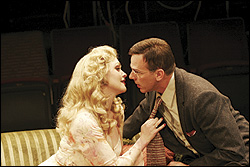Nostalgia is a dangerous trap. A soft-focus hankering for the so-called “good old days”—say, for example, a yen for the pre–racial unrest, nuclear family–centered, white-picketed Eisenhower ’50s—can lead to an epidemic of retroactive blindness and a groping after glories that never were. The tranquil vision of Ozzie and Harriet suburbia commits an amnesiac whitewash on such pricklies as Cold War paranoia, Hoover’s file keeping, Jim Crow drinking fountains, kitchen-kept women, and consumerism run amok. Conservative movements bank on just this sort of nostalgia; it’s a political tool (witness Bush’s “nucular” America, a place of old-fashioned family values and McCarthyite patriotism).
ACT’s production of Garson Kanin’s Born Yesterday (ends Sunday, July 17; 206-292-7676) trucks so heavily in nostalgia you half expect to blink in black-and-white. But this is liberal nostalgia, the flip side of the aforementioned brand. In the production notes, artistic director Kurt Beattie comments that the 1946 play was selected as part of ACT’s season largely for the “timeliness of its view of government, power, and politics,” and, to be sure, the progression of a character awakening to corruption holds an eternal appeal as a dramatic device. It’s no less manipulative or conservative or idealistic, however—in fact, it differs significantly only in one respect: It’s leavened by a sense of humor.
Here, the heroine is ditzy Billie Dawn (Jennifer Lyon), girlfriend of the cretinous Harry Brock (Richard Ziman), a junk-bond trader whose political contributions have Sen. Hedges (David Pichette) in his back pocket. The catalyst for Billie’s wising up to her man’s—and therefore the country’s—political corruption is the bespectacled Paul Verrall (Paul Morgan), a journalist sent to interview Harry, an up-and-coming D.C. power broker.
Director Warner Shook hews close to the play’s original conception, working the period detail for all it’s worth. The pacing is tight and tidy. Each character in this talented cast could have walked right out of a ’40s romantic comedy, especially the brutish, loud, cigar-chomping Ziman and Lyon, who plays the squeaky, blond bimbo-turned-firebrand with an enticing blend of vulnerability and wit.
All of this makes for a solid, enjoyable production—though, all things considered, any claims of timeliness seem a bit far-fetched. Despite a couple of audience- pleasing zingers—foremost of which is Billie’s definition of “democratic” as “not Republican!”—there’s more here that seems dated than truly relevant to this country’s miserable political climate. Born Yesterday evokes an era of American innocence that not only never existed, but is impossible to believe in any more. All it takes to shake Billie from her apathy is a little information and a nudge in the right direction. Oh, would it were so. In a sense, this is exactly the sort of nostalgia, with its implicit faith that common sense and honesty will prevail over treachery and greed, that allowed the Democratic Party to hand the last election to Bush and Co. What the Harry Brocks of this world have learned is that journalists can lead the people to scandal, but that won’t make ’em holler: think Enron, Abu Ghraib, and the Downing Street Memo.
Born Yesterday might be a surefire crowd pleaser, and a piece of theater Seattle’s literati can sink their choppers into, but it’s not necessarily the theater they need. If ACT wants timeless, it might consider re-examining something along the lines of Ibsen’s Enemy of the People, where the messenger gets shit-canned, and economic interests prevail over the quaintness of political outrage.








